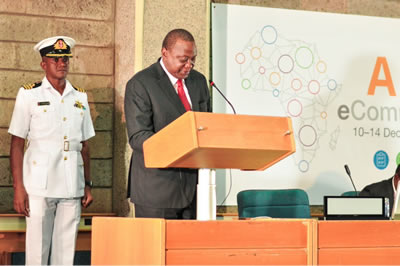The president of host country Kenya welcomes UNCTAD's Africa eCommerce Week to Nairobi as dignitaries look toward empowering African economies in the digital era.
President Uhuru Kenyatta of Kenya hailed UNCTAD’s Africa eCommerce Week as a “major milestone” on the road to a digital Africa as he officially opened the event in Nairobi on 11 December.
The five-day “eWeek” brings together government decision makers, business leaders, representatives of multilateral organizations, civil society activists and youth groups together to address what needs to happen to get Africa trading online.
“My government has been in the frontline of enhancing the digital delivery of services to our citizens,” Mr. Kenyatta said. “The objective was to reduce the cost and time of accessing government services.”
The popular M-Pesa mobile payment service had put Kenya on the digital map, he said.

Reaffirming a balance between innovation and regulation, President Kenyatta called for enhanced collaboration between e-commerce stakeholders in Africa, particularly with regard to digitizing traditional manufacturing sectors as well as to supporting new business models.
“We must enhance our manufacturing sector and make it sustainable in the digital economy,” he said.
Mr. Kenyatta also said that Africa must play its part in shaping international rule-making on e-commerce and the digital economy.
A world of challenges
Also speaking at the opening ceremony, European Commissioner for Digital Single Market, Vice President Andrus Ansip, said that the European Union was honoured to co-organize the event with the African Union and UNCTAD.
Mr. Ansip said that e-commerce could bring economic and social benefits to Africa.
“More digital will lead to more efficiency and transparency, leading to less corruption,” he added, noting the inclusive gains offered by the digital economy.
In a sense, the EU faced many of the same challenges as Africa in the new data age, Mr. Ansip said, offering to share the experience of the EU’s Digital Single Market with Africa as it builds its own version.
But he added that “without proper online connection, there is no basis for the digital economy”. However, while sub-Saharan Africa lagged in infrastructure terms, use of mobile phones and smartphones was soaring.
“Access and affordability” to broadband were crucial, he said.
“Digital demand is immense,” Mr. Ansip said, mentioning the EU’s Digital for Development initiative and its efforts to invest in telecoms infrastructure in Africa.
He said the EU stood ready to help reform legal and regulatory regimes so that start-ups and digital entrepreneurs can flourish.
“In short, we want to support Africa.”
UNCTAD Secretary-General Mukhisa Kituyi said that he had heard the call at UNCTAD’s 14th Ministerial Conference in Nairobi in 2016 that after 52 years of bringing the world to UNCTAD headquarters in Geneva it was time to bring UNCTAD to the world.
“While half the world is now online, there is a continent where three-quarters of the people are not,” he said. “That’s why we have come to Africa.”
Global e-commerce and the growth of the digital economy was rightly celebrated, he said, and more and more people in Africa were taking part, “but we cannot celebrate” while Africa’s engagement was in relative terms so low.
“The world must help Africa get on board,” Dr. Kituyi said, pointing out that the amount of aid money that was spent on digital development currently stood at around 1%.
Gender dimension
In a video statement to the conference, United Nations Deputy Secretary-General Amina Mohammed commended UNCTAD, the African Union and the European Union for hosting the event.
“The increasing importance of the digital economy is quickly changing how we live and work,” she said.
“In that context, UNCTAD’s eTrade for all initiative is a welcome effort to make it easier for developing countries to find the support they need in key policy areas,” she said.
“Let us also recognize the significant gender dimension of this work. The digital economy offers many opportunities for women: special attention should be given to women entrepreneurs and women-owned businesses in terms of access, financial services and skills building. By allowing greater access to markets, information and trade networks than ever before, e-commerce also provides our young people with increased opportunities. We need to ensure that today’s education equips them with the essential skills they need to thrive in a digital economy.”
She said the United Nations looked forward to working with e-commerce stakeholders to making e-commerce “a force for good in and beyond Africa”.


